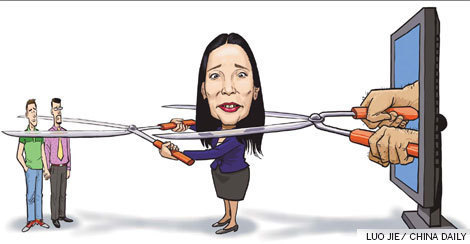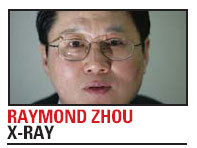The right to speak one's mind
Updated: 2011-07-14 15:38
By Raymond Zhou (chinadaily.com.cn)
|
|||||||||||

A celebrity couple's latest salvo against gays should be countered with reasoning and rational rebuttals, and not threatened with reprisals.
Before the power couple of Sun Haiying and Lu Liping became the de facto spokespersons for homophobia in China, they were representatives of a style of performance art that is rooted in the old traditions yet connected with modern audiences. Lu Liping was thrust into the eye of the latest storm when her gay-bashing slur on her micro blog was reposted and rebuked by famed Taiwan television host Kevin Tsai, who is openly gay. Before that, she was perceived by the public as the proverbial "white face", the appeaser who pulled her husband away from trouble-causing situations. Yes, Sun is a bigot, the public seemed to agree, but Lu is not and it is a pity she married a person like him.
 Well, I happened to find out a week before the rest when I interviewed the pair on June 18 at the Shanghai International Film Festival. Ever since I wrote a column in August 2007 lambasting Sun's first gesture of homophobic grandstanding, I had been curious to find out what was behind his "moral crusade" other than religious conviction.
Well, I happened to find out a week before the rest when I interviewed the pair on June 18 at the Shanghai International Film Festival. Ever since I wrote a column in August 2007 lambasting Sun's first gesture of homophobic grandstanding, I had been curious to find out what was behind his "moral crusade" other than religious conviction.
I found Sun peculiar. When he walked into the room, he seemed to be in a daze, the kind induced by inebriation. His head was constantly moving in a swirl and his eyes were mostly drifting toward the ceiling. I could only assume he had drunk a bit too much.
But he surprised me when our conversation shifted from a movie the couple had just finished to the controversial moral issue. To give them room to opt out, I deliberately couched homosexuality in euphemism. But Sun got the point without skipping a beat.
"Should an artist impose his or her own moral standards on others?" I asked.
"Universal values are universal," Sun responded. "They are not imposed on you. You tell the audience that it is something you have to abide by. Do not think of right or wrong. When you think of such things, you are already wrong."
I continued: "What if the things you consider to be universal values fall in the realm of one's personal freedom. Should what they do be tolerated if it does not hurt others?"
"Universal values are precise and must be respected by all mankind," Sun said.
"Are what you call universal values prescribed by some kind of religion?" I asked.
At this point, Lu took over: "What he referred to as universal values are human emotions shared by all, such as compassion. If we say someone's heart is eaten by a dog, we all know he has violated our common values, by doing things like abusing animals and wrecking the environment."
Sun added more examples like murder. I pointed out to them that the condition I had set was consensual behavior between adults that does not harm others, humans or animals. They raised their argument to a somewhat poetic level, categorizing human action as "light and darkness", saying no "gray area" should be allowed.